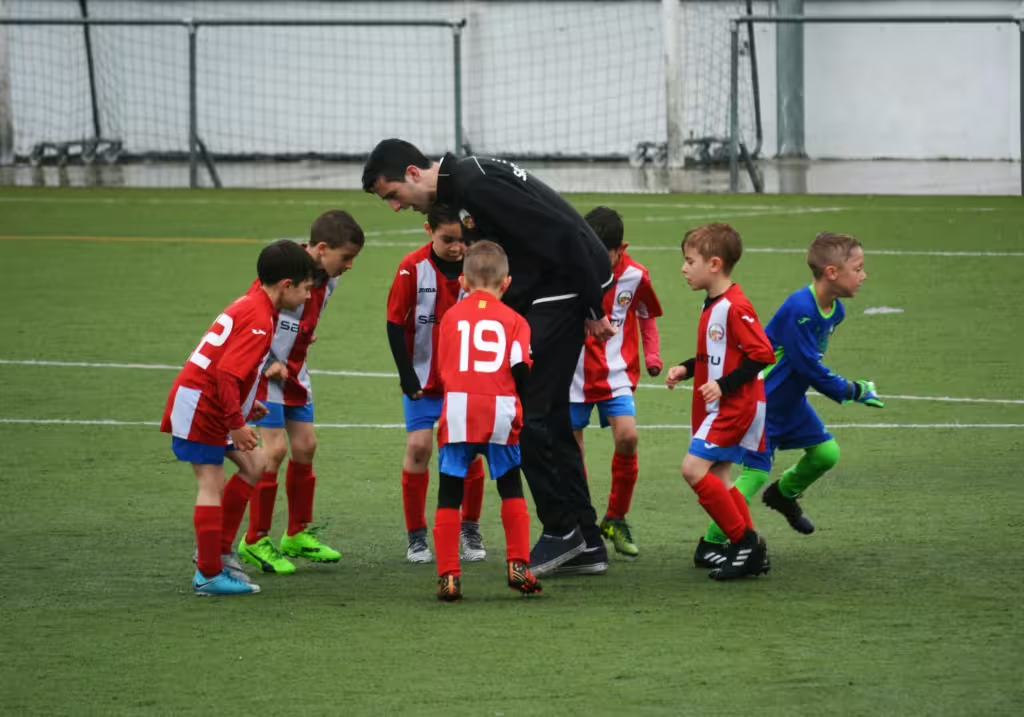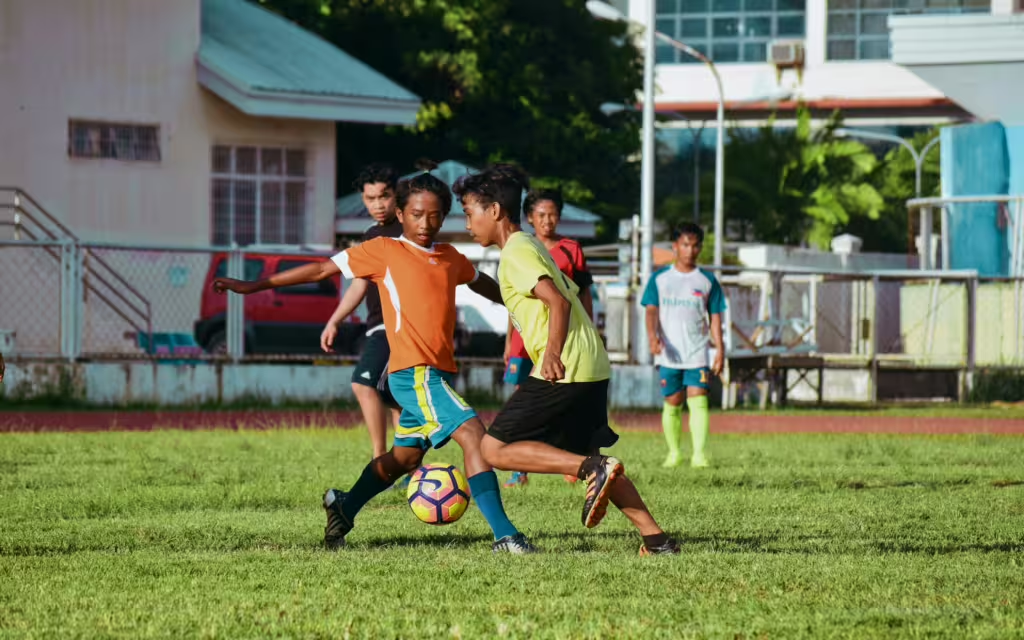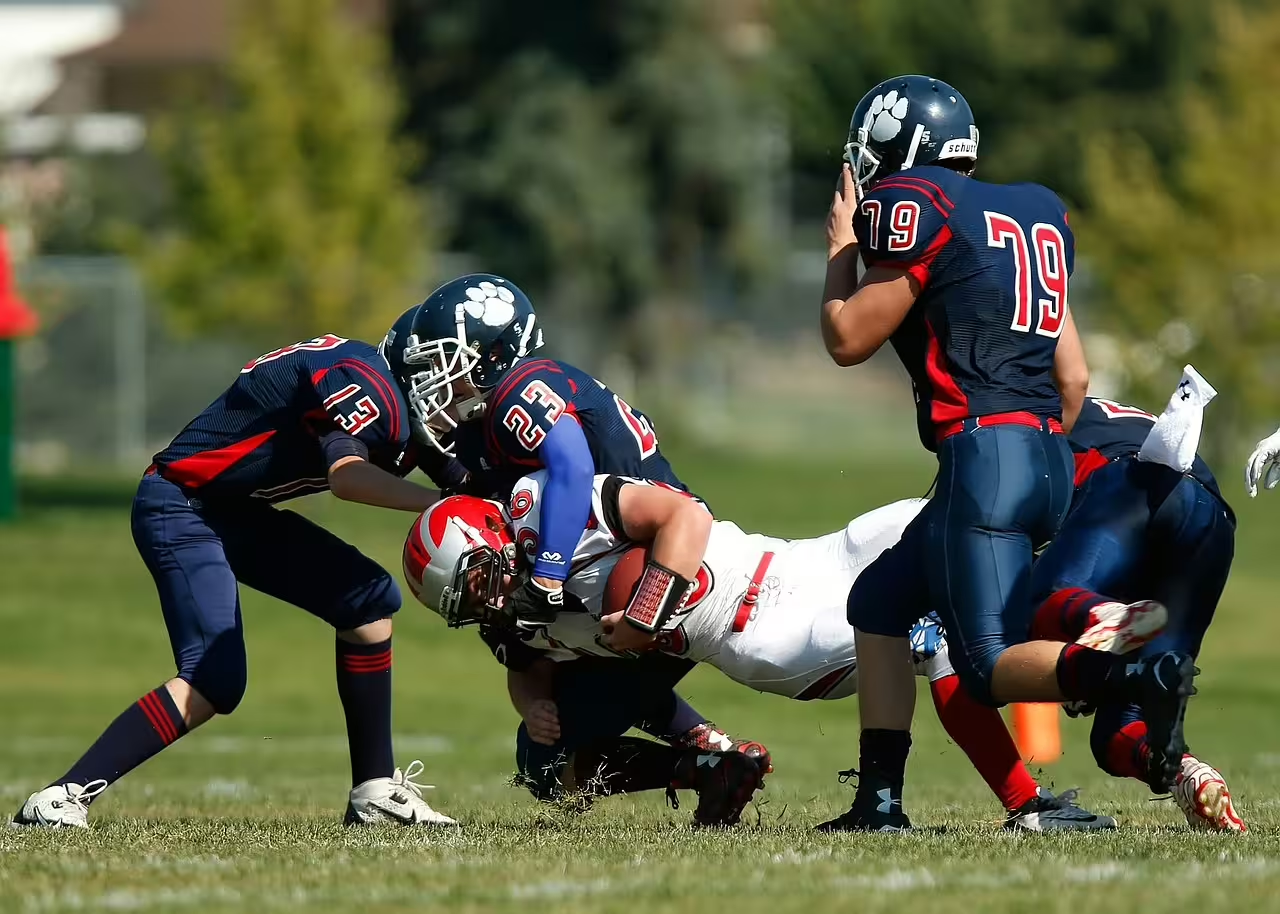Being a good sport is one of the first difficult lesson every child learns. It’s difficult because young children simply don’t “get” why they should feel good about losing or why they should congratulate the person who defeated them. It’s just not in their purview and their inflated egos already make it hard to avoid base instinctual reactions like fear, anger, and sorrow. Nevertheless, good sportsmanship is an essential part of learning to play sports.
The truth is, good sportsmanship is more than just a set of rules; it’s an important part of being a respectful competitor. Being a good sport also helps children learn how to be team players and get along with people they meet off the court as well. When kids practice good sportsmanship, they learn core values like respect, teamwork, integrity, and kindness. These values will help them on and off the field, in many areas of their future life. From shaking hands after a game to playing fair, sportsmanship shapes a young athlete’s character in a way that few other sports lessons do, It also has the added benefit of making sports more fun for everyone involved.
In this article, we will explore why good sportsmanship matters. We will define what it means to play with integrity, and teach kids how to show respect and kindness to teammates, coaches, and opponents. Whether you’re an athlete, a coach, a parent, or a fan, understanding and practicing good sportsmanship is an important part of the entire sports experience!
What is Good Sportsmanship?
Good sportsmanship means treating everyone in the game with respect; this includes, opposing players, coaches, teammates, refs, and fans. It can refer to winning or losing, such as celebrating wins humbly or handling losses gracefully. At the same time, good sportsmanship also means simply following the rules. It probably doesn’t have to be said but cheating is not considered good sportsmanship.
Being a good sports is not an innate characteristic of athletes, in general. No, good sportsmanship is a choice that athletes make every day. They choose to do what’s right, even when it’s hard, and treat everyone with the respect they deserve, even if they sometimes aren’t emotionally available to do so. Some key aspects of good sportsmanship are as follows:
Respect for Others: To be a good sport you need to show respect for your teammates, opponents, coaches, referees, and fans. Being respectful, in this regard, means valuing others and treating them fairly, no matter the score or outcome.
Playing Fair: Honesty and fair play are at the heart of good sportsmanship. To play fair, one must follow the rules, eschew cheating, and compete with integrity.
Grace in Winning and Losing: Good sportsmanship also means handling wins and losses with respect and humility. Winning is great, but it certainly isn’t a reason to brag. In the same vein, losing is not an excuse to be angry, sullen, or a quitter.
Encouraging Teammates: Good sports have good attitudes and they lift others up when they’re down. A good sport cheers for their teammates, while encouraging everyone to do their very best.
Showing Kindness: Little acts of kindness, such as helping a player up after they fall, can make a big difference in creating a positive atmosphere on the sport’s field. This is also a n example of respect, which is essential to good sportsmanship.

Why Good Sportsmanship Matters
Good sportsmanship isn’t just about following rules and respecting other competitors; it teaches young people a set of essential values that will help them grow as athletes and individuals. Practicing sportsmanship makes sports a positive experience and helps kids become better people. Below, you’ll find some more reasons why good sportsmanship is so important:
Builds Character: Playing a game with integrity teaches children the values of honesty, humility, and responsibility. These character traits will take them far beyond sports and will help them to become strong, dependable individuals.
Promotes Teamwork: Good sportsmanship encourages children to work together with their peers. It teaches that they should celebrate team success as a unit, and support each other during the ups and downs of competition. These qualities make teams stronger and more united.
Creates a Positive Environment: When players show respect ton their peers and coaches, the flow of the game tends to be more enjoyable for everyone involved. People have more fun when everyone is treated fairly and kindly.
Reduces Conflict: Good sportsmanship is a deterrent of sorts, as well. It helps prevent arguments and disagreements among players, fans, coaches, and parents. By focusing on respect and fair play, young athletes, and just about everyone else, are far less likely to get into conflicts with each other.
Teaches Valuable Life Skills: Respect, resilience, and empathy are all important skills that children can take from sports into other areas of their lives. These values will be helpful when they go to school, find a job, and in friendships or romantic relationships.
Key Values of Good Sportsmanship
As we touched on briefly before, good sportsmanship includes several core values that guide players in their behavior on and off the field. Some of the key values that make up good sportsmanship can be found here:
Integrity
Integrity is about being honest and doing the right thing. This isn’t just when someone is watching you, either. Integrity means doing what’s right even when no one can see you do it. In sports, this translates to playing by the rules, admitting mistakes, and respecting the game as a whole. Finding their own integrity helps kids builds trust with their teammates, coaches, and opponents.
Respect
We all know the meaning of respect; it’s simply treating others as you’d like to be treated. Kids should learn respect early on and it helps if parents sort of lead the way in this regard. Some parents are want to question the opinions of others, such as coaches or referees, but that isn’t exactly showing respect; and kids notice that. (Pro Tip: Kids Notice Everything.)
Whether it’s respecting a coach’s decision, an opponent’s effort, or a referee’s call, showing respect is an essential part of good sportsmanship. This respect then builds towards a more positive environment where everyone feels valued.
Responsibility
Being responsible is a tough thing for kids to master, but not impossible. In terms of sports, it means being accountable for one’s actions, both good and bad. This includes showing up to practices on time, taking care of equipment, and giving their best effort. Much of this can be bolstered by parent behavior, of course, but remember to not take too much of the onus off the child.
At the same time. responsibility also means accepting the consequences of one’s actions and learning from one’s mistakes. Parents can help with this as well, because they can encourage their kids to take responsibility in this way and praise them for it afterwards.
Empathy
Being empathic is easy, almost instinctual for some kids, and downright impossible for others, Nevertheless, empathy is an important piece of good sportsmanship. It is the ability to understand and share the feelings of others by recognizing that everyone is trying their best. it is also about respecting those efforts by recognizing that they too are trying their hardest. Empathy on the sport’s field can be as simple as congratulating an opponent after a close game or encouraging a teammate who’s feels down in the dumps.
Fairness
Fairness is about playing by the rules. Good sports are all about fairness and giving everyone a fair chance to succeed. Fair players don’t cheat or look for shortcuts along the way. Instead, they value honesty and follow the rules without issue, respecting the spirit of the game.

How to Show Good Sportsmanship
Good sportsmanship may seem like a highbrow concept, when viewed at length, but it really isn’t all that complicated. However, it does take practice, especially if you’re a young child. Below you can find some effective ways that kids can show good sportsmanship:
Respect Referees and Coaches
Referees and coaches are some of the hardest working folks in the kids sports biz. These individuals work hard to make sure games are safe and fair. There will undoubtedly be times when parents and players might think some of their decisions seem unfair, of course, and that’s the challenge. The trick to being a good sport means respecting the authority of these hard-working folks by not arguing or ignoring the. Engaging in this childish behavior can disrupt the game and create a negative environment.
Cheer for Teammates and Opponents
Teammates are teammates, even if they are having a rough time, even if they are messing up every single play. Good players support their teammates, cheering them on when they do well and encouraging them to keep trying when they don’t. By the same token, good sports should endeavor to show appreciation for their opponents’ efforts as well. It’s just a game, after all, and being a good sport to everyone is a great way to build lasting friendships in sports. After the game, kids should congratulate their opponents, win or lose, to show respect for their hard work.
Celebrate Wins Without Bragging
Winning feels great, but it’s important to not let every win go to one’s head. Practicing good sportsmanship means celebrating with humility. Bragging or putting others down after a win isn’t respectful, it’s rude, and every parent should try to curb this kind of behavior whenever possible. Instead, encourage kids to celebrate with their team, while still acknowledging the effort everyone put into the game, including their opponents.
Accept Defeats with Grace
Losing is a big part of the sports game, though it’s not always easy for kids to handle when they are young and inexperience. Nevertheless, handling a loss well shows maturity. Instead of getting angry or blaming others, teach kids to take a deep breath and focus on what they learned from the experience. Have them shake hands with their opponents, congratulate them, and use the loss as motivation to improve their skills for the next game.
Take Responsibility for Mistakes
Everyone makes mistakes, but a good sport know to take responsibility for those mistakes and own up to them. If a child misses a shot, makes a mistake, or accidentally breaks a rule, they should own up to it, and it’s often parents and coaches who have to impart this lesson to the kids in their care. Apologizing if needed and focusing on what they can do better next time shows integrity and maturity, even if it’s a hard lesson to learn.
Stay Positive and Keep Trying
Good sportsmanship includes keeping a positive attitude even when things get tough! Teach kids to stay focused and keep giving their best effort throughout the game. Staying positive helps the whole team stay motivated and builds resilience. Remember, the most important thing is to never give up.
How Parents and Coaches Can Encourage Good Sportsmanship
Parents and coaches obviously play a big role in helping young athletes develop the skills and values needed to become good sports. Below are some ways they can support kids in learning and practicing these values:
- Lead by Example: Kids look up to adults as role models, so parents and coaches must always show respect, stay calm, and encourage fair play. If kids see these values on display, they are more likely to do the same.
- Focus on Effort, Not Just Results: Encouraging kids to try their best, regardless of the outcome, helps them to stay focused on improvement and teamwork over simply winning a game.
- Reward Good Sportsmanship: Parents and coaches should always recognize and praise acts of sportsmanship. Highlighting good sportsmanship, in and of itself, helps reinforce the importance of playing with respect and kindness.
- Teach Conflict Resolution: Conflicts are going to happen in sports, so parents and coaches should be mindful of their own tempers. At the same time, teaching kids how to resolve then conflicts calmly and respectfully helps them deal with challenges on the field and in other areas of life.
Cultured Athlete Says…
Good sportsmanship is a state of being. It involves being kind, being respectful, having integrity, and following the rules. Kids should be good winners and losers, avoid bragging or sulking, and focus on fun! Remember, being a good sport makes everyone enjoy the game that much more!
Discover more from CulturedAthlete
Subscribe to get the latest posts sent to your email.






